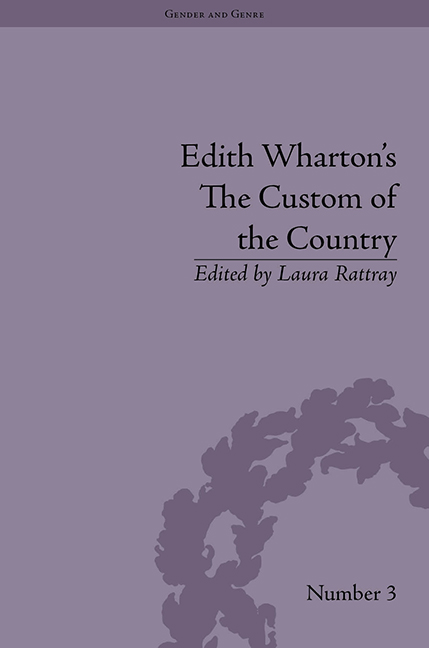Book contents
- Frontmatter
- CONTENTS
- Acknowledgements
- Editorial Note
- List of Contributors
- List of Figures
- Introduction
- 1 The Custom of the Country: Edith Wharton's Conversation with the Atlantic Monthly
- 2 When the Reading Had to Stop: Readers, Reading and the Circulation of Texts in The Custom of the Country
- 3 ‘Don't Cry – it ain't that Kind of a Story’: Wharton's Business of Fiction, 1908–12
- 4 Worst Parents Ever: Cultures of Childhood in The Custom of the Country
- 5 Crude Ascending the Staircase: Undine Spragg and the Armory Show
- 6 ‘It's Better to Watch’: Compulsive Voyeurism in The Custom of the Country and The House of Mirth
- 7 A ‘Mist of Opopanax’: Mapping the Scentscape of The Custom of the Country
- 8 Landscape with the Fall of Undine
- 9 Girls from the Provinces: Wharton's Undine Spragg and Cather's Thea Kronborg
- 10 Men at Work in The Custom of the Country
- 11 ‘Lost in Translation’: Financial Plots and the Modernist Reader in The Custom of the Country
- Notes
- Index
8 - Landscape with the Fall of Undine
- Frontmatter
- CONTENTS
- Acknowledgements
- Editorial Note
- List of Contributors
- List of Figures
- Introduction
- 1 The Custom of the Country: Edith Wharton's Conversation with the Atlantic Monthly
- 2 When the Reading Had to Stop: Readers, Reading and the Circulation of Texts in The Custom of the Country
- 3 ‘Don't Cry – it ain't that Kind of a Story’: Wharton's Business of Fiction, 1908–12
- 4 Worst Parents Ever: Cultures of Childhood in The Custom of the Country
- 5 Crude Ascending the Staircase: Undine Spragg and the Armory Show
- 6 ‘It's Better to Watch’: Compulsive Voyeurism in The Custom of the Country and The House of Mirth
- 7 A ‘Mist of Opopanax’: Mapping the Scentscape of The Custom of the Country
- 8 Landscape with the Fall of Undine
- 9 Girls from the Provinces: Wharton's Undine Spragg and Cather's Thea Kronborg
- 10 Men at Work in The Custom of the Country
- 11 ‘Lost in Translation’: Financial Plots and the Modernist Reader in The Custom of the Country
- Notes
- Index
Summary
A reader will not find it easy to put up with the ‘hero’ of a long narrative who proves to be an absolutely unmitigated scoundrel.
Alter, Rogue's ProgressA caricature does not remain interesting to the length of six hundred pages.
Boynton, ‘Mrs. Wharton's Manner’Edith Wharton's The Custom of the Country is usually regarded generically as a picaresque novel. But a novel cannot be considered picaresque without a picaroon. Undine Spragg is anything but a picaroon, who, by definition, survives by her wits; tends towards criminal behaviour of a financially remunerative nature, but never causes physical harm; explores the various customs and cultures of the society into which she is inserted through the episodic nature of the text and her malleable identity; brings a complete sense of ingenuousness, so that the impressions garnered on her travels through the cultural country may be left to the reader for judgement and evaluation. Ultimately, the picaroon is a charming rogue who succeeds; however, Undine is witless, vicious in her narcissism, careers from one tier of upper-class society to another, completely disingenuous, ruthless, distasteful to the reader and, ultimately, a failure. She is not the subject of The Custom of the Country, nor is she an agent of the customs or the country.
The most famous picaresque novels tend to be eponymous: Roderick Random, The Fortunes and Misfortunes of the Famous Moll Flanders, The Adventures of Huckleberry Finn.
- Type
- Chapter
- Information
- Edith Wharton's The Custom of the CountryA Reassessment, pp. 115 - 126Publisher: Pickering & ChattoFirst published in: 2014

